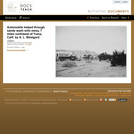
Photo taken 11/20/1911
- Subject:
- Arts and Humanities
- Material Type:
- Diagram/Illustration
- Primary Source
- Provider:
- National Archives and Records Administration
- Provider Set:
- DocsTeach
- Date Added:
- 11/20/1911

Photo taken 11/20/1911
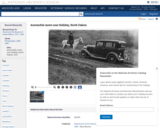
In this 1949 photo from the National Archives an automobile is shown with a man on horseback.
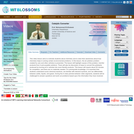
This video lesson aims to motivate students about chemistry and to raise their awareness about how chemistry helps in solving certain environmental problems. In this lesson, the air pollution problem created by cars and other vehicles is presented. The lesson will highlight causes of this problem, harmful products from it and possible solutions. There will also be discussion of ways to convert the pollutants produced by burning oil in vehicles into more friendly products.

En este espacio podran aprender a realizar la Comprobación del estado de la batería del Automómovil de una forma básica y fácil.
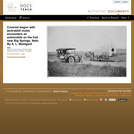
This photo was taken in 1912 A. L. Westgard

This course will explore how Americans have confronted energy challenges since the end of World War II. Beginning in the 1970s, Americans worried about the supply of energy. As American production of oil declined, would the US be able to secure enough fuel to sustain their high consumption lifestyles? At the same time, Americans also began to fear the environmental side affects of energy use. Even if the US had enough fossil fuel, would its consumption be detrimental to health and safety? This class examines how Americans thought about these questions in the last half-century. We will consider the political, diplomatic, economic, cultural, and technological aspects of the energy crisis. Topics include nuclear power, suburbanization and the new car culture, the environmental movement and the challenges of clean energy, the Middle East and supply of oil, the energy crisis of the 1970s, and global warming.
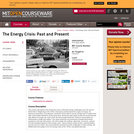
This course will explore how Americans have confronted energy challenges since the end of World War II. Beginning in the 1970s, Americans worried about the supply of energy. As American production of oil declined, would the US be able to secure enough fuel to sustain their high consumption lifestyles? At the same time, Americans also began to fear the environmental side affects of energy use. Even if the US had enough fossil fuel, would its consumption be detrimental to health and safety? This class examines how Americans thought about these questions in the last half-century. We will consider the political, diplomatic, economic, cultural, and technological aspects of the energy crisis. Topics include nuclear power, suburbanization and the new car culture, the environmental movement and the challenges of clean energy, the Middle East and supply of oil, the energy crisis of the 1970s, and global warming.
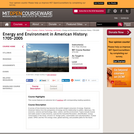
A survey of how America has become the world's largest consumer of energy. Explores American history from the perspective of energy and its relationship to politics, diplomacy, the economy, science and technology, labor, culture, and the environment. Topics include muscle and water power in early America, coal and the Industrial Revolution, electrification, energy consumption in the home, oil and US foreign policy, automobiles and suburbanization, nuclear power, OPEC and the 70's energy crisis, global warming, and possible paths for the future.

A survey of how America has become the world's largest consumer of energy. Explores American history from the perspective of energy and its relationship to politics, diplomacy, the economy, science and technology, labor, culture, and the environment. Topics include muscle and water power in early America, coal and the Industrial Revolution, electrification, energy consumption in the home, oil and U.S. foreign policy, automobiles and suburbanization, nuclear power, OPEC and the 70's energy crisis, global warming, and possible paths for the future.
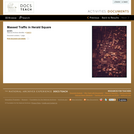
Photo of traffic in Herald Square (New York City) taken in April 1973.
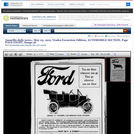
Ad for the Model T Ford in the Amarillo daily news. (Amarillo, Tex.), 05 May 1912.
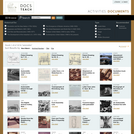
Examine a collection of primary source documents about automobiles in American history.
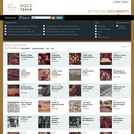
Examine a collection of primary source documents about traffic in American history.
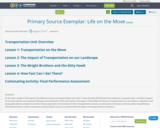
In this unit, students will explore the different forms of transportation over time—from the New World and early America, to present day—and their impact on society and the environment (Change and Continuity). They will explore the impact of the different forms of transportation on economics, migration, and geography (where people live and how they adapt their environment to their transportation need), as well as how to become critical readers by gathering information from a variety of primary and secondary sources to understand the impact of transportation on history.
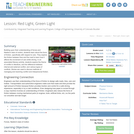
Building upon their understanding of forces and Newton's laws of motion, students learn about the force of friction, specifically with respect to cars. They explore the friction between tires and the road to learn how it affects the movement of cars while driving. In an associated literacy activity, students explore the theme of conflict in literature, and the difference between internal and external conflict, and various types of conflicts. Stories are used to discuss methods of managing and resolving conflict and interpersonal friction.
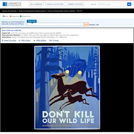
Poster showing two deer crossing road in front of approaching car. Date stamped on verso: Jul 18 1940. Department of the Interior, National Park Service. Poster design attributed to John Wagner. Posters of the WPA / Christopher DeNoon. Los Angeles : Wheatly Press, c1987, no. 171